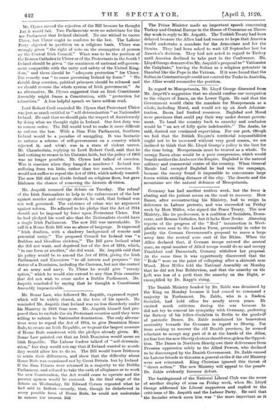Mr. Clynes moved the rejection of the Bill because he
thought tat it would fail. Two Parliaments were. no substitute for the one Parliament that Ireland claimed. No one wished to coerce Ulster, but Ulster ought to conform to the law. The Labour Party objected to partition on a religious basis. Ulster was wrongly given "the right of veto on the assumption of powers oy the Central Irish Council." What was to be the position of the Roman Catholics in Ulster or -4:;d the Protestants in the South ? Ireland should be given "the maximum of national self-govern- ment compatible with the unity and safety of the United King- dom," and there should be "adequate protection" for Ulster. The remedy was "to cease governing Ireland by force." "We should drop coercion, political prisoners should be released and we should reverse the whole system of Irish government." As an alternative, Mr. Clynes suggested that an Irish Constituent Assembly might frame a Constitution, with "protection for minorities." A less- helpful speech we have seldom read. _


































 Previous page
Previous page